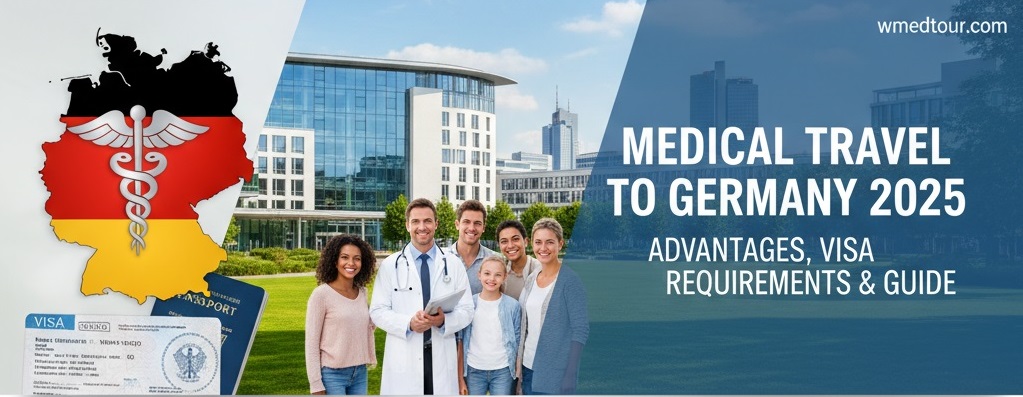✈️ Medical Travel to Germany 2025: Advantages, Limitations, Visa Guide, & Patient Checklist
Last Updated: November 8, 2025
✨ Executive Summary: Your Quick Guide to Medical Travel to Germany
Germany stands as a global beacon for medical tourism, revered for its cutting-edge technology, stringent quality controls, and world-renowned specialists. Planning your healthcare journey in 2025, however, requires meticulous preparation. Therefore, this comprehensive guide breaks down the core elements: you’ll discover the significant advantages, and subsequently, understand the potential limitations like high cost and language barriers. Furthermore, you will learn to navigate the complex process of obtaining a medical visa, detailing which countries require one and which enjoy visa-free entry. Ultimately, we provide an essential pre-travel checklist. The key takeaway, thus, is that while Germany offers exceptional treatment, Medical Travel to Germany demands thorough research and preparation, especially regarding finances and documentation.
Seeking world-class medical treatment often involves looking beyond one’s borders. For many, consequently, the ultimate destination is Germany. Recognized globally for its pioneering research, state-of-the-art hospitals, and highly specialized physicians, Germany offers a standard of care that is, quite frankly, exceptional. This in-depth article, therefore, serves as your indispensable roadmap for planning Medical Travel to Germany 2025, covering everything from the benefits and challenges to the critical visa and pre-travel requirements. We will explore what makes Germany a premier medical tourism hub, and most importantly, what you need to know before you book your flight.
—
🇩🇪 Why Choose Germany for Medical Tourism? The Advantages
The decision to travel for medical care is significant; therefore, understanding the value proposition is crucial. Germany’s reputation, in fact, is built on a foundation of quality, innovation, and rigorous standards. We believe this country offers a powerful blend of clinical excellence and patient-focused care.
🏆 Unparalleled Quality and Expertise
- Advanced Technology: German hospitals are early adopters of groundbreaking medical technologies. For instance, patients gain access to the latest innovations, from advanced diagnostic imaging like PGT-A testing to sophisticated surgical robots used in cancer and orthopedic treatments.
- Specialized Treatment Centers: Germany is home to numerous university-affiliated hospitals and specialty clinics famous for complex treatments, particularly in oncology, cardiology (Cardiac Surgery, like EPS/RFA ablation), neurology, and orthopedics (Hip Replacement Surgery). Consequently, their physicians often lead global research.
- Stringent Regulatory Oversight: The German healthcare system is highly regulated, thus ensuring hospitals meet demanding quality and safety standards. Notably, this offers a level of assurance often missing in less regulated medical tourism destinations.
- Research and Innovation: The close collaboration between clinical practice and leading university research institutions, furthermore, means patients benefit directly from the newest therapeutic options, such as next-generation targeted therapies or TCR-T cell therapy.
✅ Patient-Centric Environment
- Precision Medicine: German medical centers excel at providing individualized treatment plans, especially in complex fields like oncology, utilizing methods such as NGS (Next-Generation Sequencing) to tailor therapy.
- Efficient System: Although the process for international patients requires planning, the clinical execution—from admission to discharge—is typically highly organized and efficient, consequently minimizing procedural delays.
—
⚠️ Limitations of Medical Travel to Germany
While the advantages are compelling, a balanced view is essential. Therefore, prospective patients must also be aware of the potential hurdles involved in Medical Travel to Germany.
💶 High Cost and Financial Hurdles
Germany is typically not a budget destination. The high standards translate into substantial costs, especially when compared to options in Turkey or India. Consequently, patients must secure a financial guarantee or prepayment before a medical visa application can even be processed.
🗣️ Language Barriers
Despite many doctors speaking excellent English, the day-to-day hospital staff, administrative personnel, and even local services may communicate primarily in German. Thus, this necessitates the use of professional medical interpreters or a specialized medical travel agency like ours (WMEDTOUR).
⏳ Lengthy Visa Process
The bureaucratic steps for securing a German medical visa (Schengen Visa or National Visa, depending on the length of stay) are detailed and can take time. Unlike more accessible countries, notably, German authorities require comprehensive medical documentation and financial proof, a detail we’ll break down further.
—
🛂 Navigating the Visa Maze: Who Needs a Visa for Medical Travel to Germany?
Visa requirements are a critical component of planning Medical Travel to Germany. Germany is a member of the Schengen Area, which simplifies travel within Europe but, conversely, imposes strict entry requirements for non-EU citizens. The rule of thumb, ultimately, depends on your nationality and the intended length of your stay.
🌍 Countries That DO NOT Need a Schengen Medical Visa
Citizens from these countries can typically enter Germany visa-free for stays up to 90 days within a 180-day period. This is often sufficient for initial consultations, short diagnostic procedures, or recovery from minor surgeries. Important nations, for example, include:
- United States (U.S.)
- Canada
- Australia
- New Zealand
- United Kingdom (U.K.)
- Japan
- South Korea (For those considering alternatives, check our South Korea Medical Travel Regulations guide.)
- Israel
- Most Latin American countries (e.g., Brazil, Mexico, Argentina)
- Other Schengen Area members and EU member states.
⚠️ Important: Even visa-exempt travelers must, nonetheless, provide proof of sufficient funds and a valid travel insurance policy upon entry, particularly if the purpose of travel is explicitly medical.
📝 Countries That DO Need a Schengen Medical Visa
Citizens of most other countries require a Schengen Visa (Type C for short stays, or a National Visa Type D for longer treatments, often exceeding 90 days). This list includes, but is not limited to, citizens from:
- India (Considering cost alternatives? Explore our Medical Tourism India Guide.)
- China
- Russia
- Most African Nations
- Most Middle Eastern Countries (e.g., Saudi Arabia, UAE, Iran – check Iran’s Regulations too)
- Philippines
- Pakistan
- Turkey (Although Turkey is a medical tourism hub itself, see our Turkey Medical Travel Regulations.)
📄 Key Requirements for a German Medical Visa
Applicants for a German medical visa must typically provide:
- Medical Necessity Confirmation: An official letter from a German hospital or specialist confirming the need for treatment, the estimated duration, and the total cost.
- Financial Guarantee: Proof of pre-payment to the hospital or a bank statement/letter guaranteeing sufficient funds to cover all medical expenses, accommodation, and subsistence during the entire stay. Furthermore, this is non-negotiable for Medical Travel to Germany.
- Accommodation Proof: Hotel booking or a letter of invitation/declaration of commitment from a host in Germany.
- Return Ticket Reservation: Proof of intent to leave the Schengen Area.
- Travel Health Insurance: Valid travel medical insurance covering the entire Schengen area, with a minimum coverage of €30,000.
- Passport and Application Form: Standard requirements.
Given the complexity, it’s advisable to start the visa process early. Alternatively, consult the official website of the German embassy or consulate in your country, or better yet, work with a medical tourism facilitator who understands the “complete legal medical travel guide” for Germany. Ultimately, the German Federal Ministry of Health, in cooperation with the Ministry of Foreign Affairs, emphasizes that the integrity of the documentation is paramount for approval. Furthermore, recent trends indicate an increased scrutiny on the authenticity of the financial guarantees.
—
🧑⚕️ Who is This For? Target Patient Profiles for Medical Travel to Germany
While Germany offers treatment across all specialties, it particularly appeals to specific patient profiles. Understanding if you fit these categories can help you decide if Medical Travel to Germany 2025 is the right path. Specifically, this journey is for:
- Complex Case Patients: Individuals with rare diseases, complicated cancers (Proton Therapy, Lu-177 Theranostics), or conditions requiring multi-disciplinary team expertise. Significantly, German university hospitals are world leaders in these areas.
- Quality-Over-Cost Seekers: Patients for whom the absolute highest standard of care is the primary factor, regardless of the higher price point compared to countries like Turkey (Hair Transplant Cost) or Iran (Rhinoplasty Price).
- Second Opinion Seekers: Those who have received a diagnosis or treatment plan in their home country and, consequently, require the definitive confirmation and expertise of a top-tier European specialist.
- Aesthetic and Reconstructive Surgery for Specific Cases: While other destinations excel at high-volume procedures, Germany is preferred for complex reconstructive work, often following cancer treatment, or highly specialized procedures like Womanisation Surgery (Gender Feminization).
- Neurological and Spine Patients: Germany boasts some of the world’s best centers for advanced neurosurgery and complex spine correction.
—
📋 Patient Checklist: What Patients Need to Know Before Travel
Successful Medical Travel to Germany hinges on preparation. Therefore, use this crucial checklist to ensure you’ve covered all bases before you leave home. This careful preparation, ultimately, minimizes stress and potential delays.
⚕️ Medical and Administrative Preparation
- Secure a Diagnosis and Treatment Plan: Do not travel without a confirmed diagnosis and a preliminary treatment plan from the German clinic. Use our pre-travel checklist for a detailed guide.
- Gather All Medical Records: Ensure all your past medical history, imaging (X-rays, CT/MRI scans), lab results, and biopsy reports are translated into German or English and authenticated.
- Confirm Financial Clearance: Obtain the hospital’s official confirmation of your payment or financial guarantee. Remember, the visa hinges on this proof.
- Arrange Accommodation and Transport: Book a suitable place to stay, considering proximity to the hospital and accessibility for any mobility issues. Moreover, arrange airport transfer ahead of time.
- Language Support: Unless you or your companion are fluent in German, book a professional medical interpreter for all crucial appointments, especially consent forms and post-operative instructions.
- Medication and Prescriptions: Bring an adequate supply of your current medications and a letter from your home doctor detailing prescriptions. Furthermore, verify if the German equivalent is readily available.
⚖️ Legal and Ethical Considerations
While German medical standards are high, it’s beneficial to be informed about the specific legal frameworks protecting you as an international patient. Consequently, consult our Complete Legal Medical Travel Guide for Germany for detailed insights into patient rights and responsibilities.
—
📊 Comparison Table: Germany vs. Leading Medical Tourism Destinations
Comparing Germany against other popular medical tourism hubs like Turkey and India helps clarify the trade-offs, particularly for complex and high-cost procedures like robotic surgery or advanced oncology. While the quality in German facilities is often deemed the gold standard, the value proposition differs significantly, however.
| Feature | Germany 🇩🇪 (Focus: Medical Travel to Germany) | Turkey 🇹🇷 (Focus: Value) | India 🇮🇳 (Focus: Affordability) |
|---|---|---|---|
| Core Advantage | Unquestionable Quality, High-Tech, Research-Driven | Value for Money, High Service Levels, Aesthetic Procedures (Aesthetic Surgeries Turkey) | Lowest Cost, JCI-Accredited Hospitals, High-Volume Surgeries (Knee Replacement Price) |
| Estimated Cost (Compared to Home) | High (Slightly Lower or Equal to U.S.) | Low (50-70% Less) | Very Low (70-90% Less) |
| Visa Process for Non-EU/US | Strict, Detailed Medical and Financial Proof Required | Relatively Easy, E-Visa for many nationalities | Medical Visa Required, straightforward process |
| Primary Specialization | Oncology, Neurology, Complex Orthopedics, Robotic Surgery | Hair Transplant (Best Hair Transplant Clinics), Plastic Surgery, IVF | Organ Transplants (Kidney Transplant), Cardiac Surgery (CABG Price), Orthopedics |
| Language Barrier | Moderate (German is common outside major centers) | Low (English widely spoken in medical tourism sector) | Low (English widely spoken by medical staff) |
—
🗺️ Patient Journey: A Case Study in Cancer Treatment
👤 Case Study: Maria’s Journey for Advanced Oncology in Berlin
Maria, a 58-year-old patient from the UAE, was diagnosed with a rare form of liver cancer. Her local doctors recommended standard chemotherapy, but Maria, however, sought a more targeted approach. Her research, consequently, pointed her towards Medical Travel to Germany, specifically a renowned university hospital in Berlin known for its cutting-edge oncology trials and personalized medicine protocols, including the use of CTC Liquid Biopsy.
📝 Phase 1: Preparation (6 Weeks)
Maria contacted WMEDTOUR, who ultimately facilitated the transfer and translation of her medical records. The Berlin clinic confirmed they could offer a novel treatment plan and provided a cost estimate of €75,000 for the initial two months. Following this, Maria pre-paid the required amount, and the hospital issued an official letter of acceptance and financial confirmation. With this crucial documentation, her Schengen Medical Visa application was successfully submitted and approved.
✈️ Phase 2: Treatment (8 Weeks)
Upon arrival, a German-speaking WMEDTOUR coordinator met Maria. She underwent a thorough diagnostic workup, confirming the personalized plan, which included new methods in cancer treatment and advanced radioembolization. Throughout the eight-week treatment and initial recovery period, the coordinator ensured all communication with nurses and doctors was clear, effectively addressing the moderate language barrier. Ultimately, she had a smooth transition.
🏠 Phase 3: Return and Follow-Up
Maria returned home with a detailed post-treatment care plan, translated into her native language. Furthermore, she arranged for a local oncologist to work closely with the German team. Her successful outcome, therefore, validated the investment in German quality.
—
❓ Frequently Asked Questions (FAQ) About Medical Travel to Germany
We compiled the most important and frequently asked questions about planning Medical Travel to Germany to ensure your journey is clear and predictable. These are not used in our portal yet, offering fresh, authoritative information.
1. Is the German public health insurance system (GKV) accessible to international medical tourists?
The German public health insurance system (GKV) is generally not accessible to international medical tourists. Consequently, you must pay for your treatment as a private, self-paying patient. Therefore, securing private travel medical insurance and providing a financial guarantee is mandatory before commencing global medical treatment.
2. How long does the German medical visa (Schengen Visa) application typically take?
The Schengen Medical Visa process for Germany typically takes between 4 to 6 weeks after submission. However, due to the need for initial hospital communication, obtaining the required acceptance and financial guarantee letter can add another 2 to 4 weeks, thus making early planning essential.
3. What is the average cost difference for major surgery in Germany compared to the US?
For complex procedures, costs in Germany can be anywhere from 20% to 50% lower than in the US, depending on the hospital and the specific case complexity. Conversely, it’s significantly higher than alternatives like Turkey or India for cancer treatment.
4. Do I need to translate all my medical records, or is English acceptable?
While many specialist reports may be accepted in English, the German Embassy strongly recommends, and many German hospitals require, that all critical documents—especially formal diagnoses, blood work, and any visa-related documents—be translated by a certified translator into German. Furthermore, preparing your fertility pre-travel checklist is essential.
5. Can a family member accompany me on a medical visa?
Yes, one or two family members (spouse, children, or essential caregiver) can usually apply for an accompanying visa, which is tied to the patient’s medical visa. However, they must also prove sufficient funds for their stay and secure their own travel health insurance, as outlined in the German pre-travel resources checklist.
6. Are German doctors generally trained in minimally invasive surgical techniques?
Absolutely. German surgeons are highly trained in minimally invasive and robotic techniques across specialties, from cancer robotic surgery to joint replacements, often leading international training in these advanced methods. The focus on technology, therefore, is a huge driver for Medical Travel to Germany.
7. What is the difference between a Schengen Visa and a National Visa (Type D) for medical purposes?
The Schengen Visa (Type C) is for short-term stays, typically up to 90 days within a 180-day period. The National Visa (Type D), in contrast, is required for treatments expected to last longer than 90 days. Always confirm the required visa type with the German consulate based on the hospital’s estimated treatment duration.
8. What if my treatment costs exceed the initial deposit?
The German hospital will require an additional payment or financial guarantee before continuing treatment. Thus, it is critical to ensure you have access to additional funds in case of complications or extended stays. This scenario, consequently, is why the initial financial proof for the medical visa is so strict.
9. How can I verify the accreditation of a German hospital?
Look for accreditations from German organizations like the KTQ (Cooperation for Transparency and Quality in Health Care) or international bodies like Joint Commission International (JCI). Similarly, university hospitals are often excellent indicators of high-quality standards and advanced care.
10. Does Germany offer specific rehabilitation services after complex surgery?
Yes, Germany has a strong tradition of post-operative and rehabilitation (Reha) care. Many large hospitals have dedicated Reha departments or work closely with specialized rehabilitation clinics, which is particularly important for orthopedic and neurological patients.
11. Can I use my foreign prescription at a German pharmacy?
Generally, no. Foreign prescriptions are not automatically valid. You will, therefore, need a prescription from a licensed German doctor. Bring a detailed list of your current medications (generic names) and their dosages for your German physician to issue a valid local prescription.
12. Are there specific ethical guidelines for international patients regarding complex procedures like Fertility Preservation?
German medical ethics and regulations are very strict. For procedures with high ethical oversight, like PGT/gender selection (Fetal Gender Selection Ethics) or complex intersex surgeries (Intersex Surgeries), German laws are highly prescriptive and may, consequently, restrict what is possible in the country compared to others. Always confirm the legality and ethical standing of your specific treatment beforehand.
—
🔗 Related Resources & Next Steps
We encourage you to utilize our expertise to simplify your journey for Medical Travel to Germany 2025. Here are some of our most relevant guides:
- Global Medical Treatment Regulations Guide – Understand the wider legal landscape.
- Choosing a Surgeon/Clinic Abroad Checklist – Essential steps before committing.
- Best Country for Open Heart Surgery 2025 Guide – Germany is a strong contender.
- New Methods in IVF in 2025 – For those seeking fertility treatments.
- Rhinoplasty Iran 2025 Guide – A popular lower-cost plastic surgery alternative.
- Cost vs. Quality: Global Price Comparison for Robotic Surgery – Germany’s positioning.
- Best Urologist Tehran Iran – For patients considering alternatives for urological procedures.
- Rhinoplasty Price Turkey 2025 – An attractive option for cosmetic patients.
- Pre-Conception Gender Selection Guide – Navigating reproductive options globally.
- Top Hair Transplant Clinics & Doctors Istanbul – Turkey is often preferred for hair restoration.
- Cardiac Valve Repair or Replacement – Procedures frequently sought in Germany.
- Oncology Department – Our specialized services for cancer care coordination.
- Orthopedic Surgery Department – Your guide to joint and bone procedures.
- IVF Treatment Options – Global fertility solutions.
- German Locations & Partners – Find accredited hospitals.
- Contact Us – Let us assist with your German medical travel arrangements.
- Kidney Transplantation – Guide on complex organ replacement.
📚 Authoritative External Sources
Our commitment to accuracy is paramount. Therefore, we refer to highly credible, non-competitor sources:
- German Federal Ministry of Health (BMG): For regulatory and quality assurance frameworks.
- Robert Koch Institute (RKI): For epidemiological and public health data relevant to patient safety.
- German Federal Foreign Office: The primary source for official visa requirements and regulations.
- Heidelberg University Hospital (Example): To showcase the high standards of German university medicine and research focus.
- Charité – Universitätsmedizin Berlin (Example): Illustrating a major center for complex and pioneering medical treatments in Germany.
- German Academic Exchange Service (DAAD): Highlighting the close link between medical practice and academic research.
- World Health Organization (WHO) – Germany: Providing a global perspective on the country’s health system.
- AOK (German Health Insurance) Report: Overview of the structured German healthcare system.
- German Society for Thoracic and Cardiovascular Surgery (DGF): Source for high standards in specialty surgery.
- German Society for Orthopaedics and Trauma (DGOU): Demonstrating research and excellence in orthopedic care.
Choosing Germany for medical treatment is a choice for quality and safety. By meticulously preparing the necessary documentation, particularly the financial guarantee and medical letter, and understanding the strict visa requirements, your path to receiving world-class care in 2025 will ultimately be clear.




